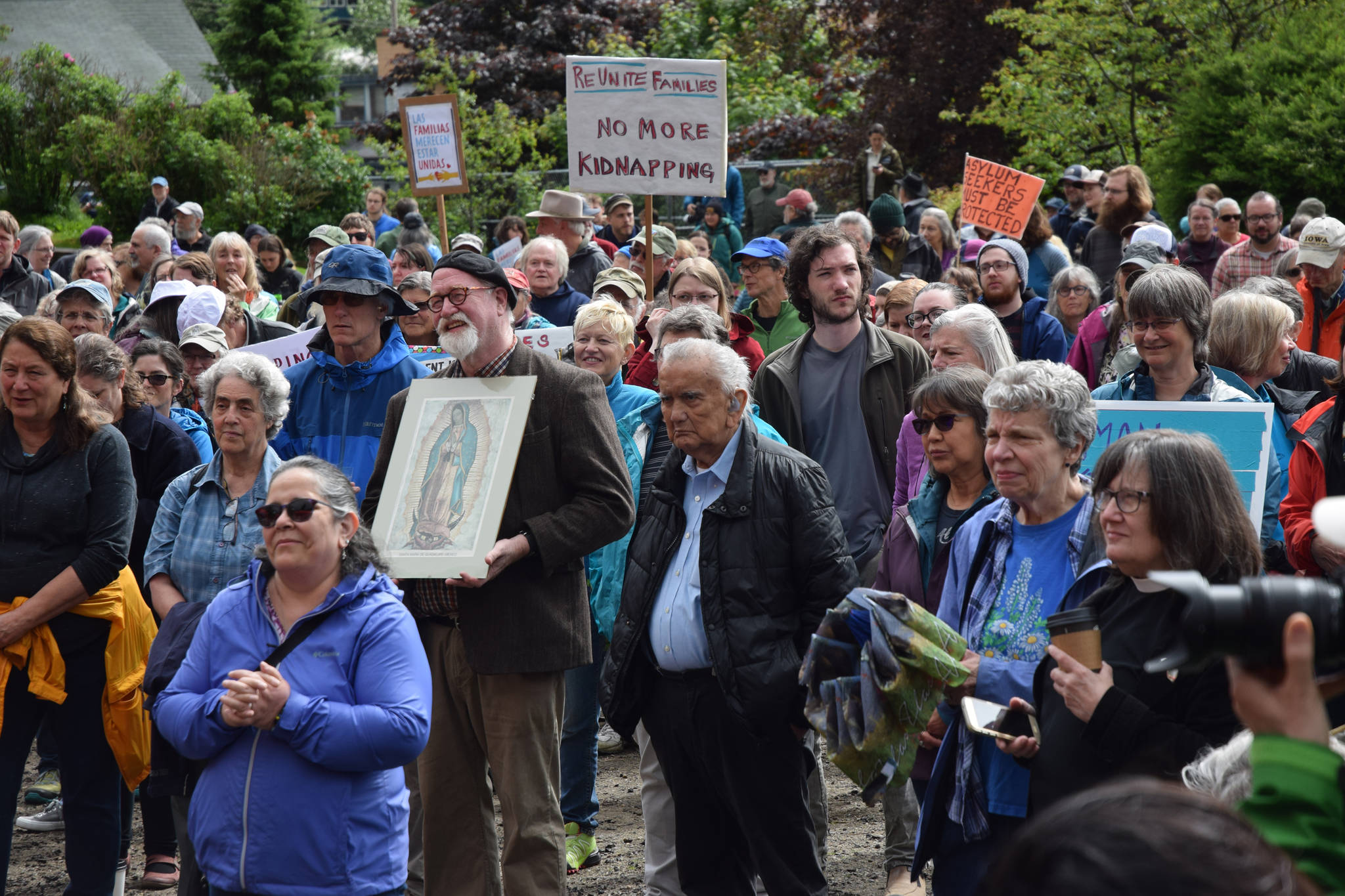The Families Belong Together Rally on Saturday drew an estimated 400 people, who came to speak out against the separation of children from their families at the U.S. southern border.
“We are with you here today making our voices loud and clear,” Claire Richardson, chief of staff for Lt. Gov. Byron Mallott and one of the rally’s speakers, said to the crowd. “We will not tolerate what is happening on our border.”
Since a zero tolerance policy toward illegal border crossings was adopted in April, 2,342 children have been separated from their parents after crossing the U.S. southern border, according to media reports.
The protesters, led by the nonpartisan Juneau League of Women Voters, rallied at the same time as protesters in Anchorage and around the U.S. on Saturday morning.
Some in Juneau held signs reading “human-kind. Be both,” “Reunite families. No more kidnapping,” and “Love your neighbor as yourself.”
Mother Christal Higdon pushed her three-year-old daughter Matilda on a swing set at the rally, which took place at a playground. The separation of children at the border is “horrible,” Higdon said, “I have nightmares about it.”
She came to the rally as part of her plans to make a difference in the issue. Higdon is a member of the Juneau political action group PerSisters. She’s contacting Alaska’s congressional representatives to voice her displeasure with family separation.
“Gotta do something,” Higdon said.
Nearby, rally participants Chris Thorn and wife Danielle Thorn watched their children Maggie, 4, and Sam, 1.
Thorn, who works in health care, said he’s read media reports that children are being medicated to deal with the trauma of separation.
The ends don’t justify the means, Chris Thorn said.
“I think it’s pretty disturbing the level of dehumanization that has to go on to enable somebody to separate a child from a parent. Not only to do that, but to enable them to not allow these children to comfort each other. … Some of them are being medicated because they’re upset and they’re acting out, which is a normal response. It’s pretty disturbing,” Thorn said.
Like other parents the Empire spoke to at the rally, Thorn said he “can’t even imagine,” being separated from his children.
Attorney General Jeff Sessions began enforcing a zero-tolerance policy toward illegal border crossing in April. The policy instructed federal prosecutors to pursue criminal prosecution for every adult who illegally crossed the border or tried to do so.
President Donald Trump signed an executive order on June 20 intended to end family separation and quell the widespread uproar over the detention of children. Trump’s order didn’t restore the old approach of releasing those suspected of illegally crossing the border while their cases were being prosecuted. Instead, the order states, it will now be the Trump administration’s policy to keep families together in detention.
Gov. Bill Walker recently urged the Trump administration to end its policy of splitting children from their parents, as did two prominent Alaska Native leaders in Juneau. Sealaska Heritage Institute President Rosita Worl and Central Council of Tlingit and Haida Indian Tribes of Alaska President Richard Peterson both referred to the past policy in Alaska, separating Alaska Native children from their families and forcing them to attend boarding schools.
Protesters: America is no longer the world’s safe haven
Eight speakers spoke at the Juneau rally, including Alaska Native author and Alaska State Writer Laureate Ernestine Hayes. She used a construction metaphor to describe America’s political climate.
“Our house has to be knocked down to studs and joists because it has been so corrupted from the inside,” Hayes said. “… It’s a certainly accurate metaphor for why we’re here today.”
Several speakers lamented America’s loss of status as a safe haven for suffering immigrants.
Juneau resident Mansour Sadeghi, who immigrated to Alaska from Iran 30 years ago, quoted Emma Lazarus’ sonnet, “New Colossus,” installed at the foot of the Statue of Liberty.
“This is what we stand for, this is why people come to this country,” Sadhegi, 58, said. “Give me your tired, your poor, your huddled masses yearning to breathe free.”
Sadeghi follows the Bahá’í faith, the second biggest faith in Iran following Islam, and immigrated to America to flee religious persecution.
“Every immigrant has these or their own story. I never thought, even in a million years, that I would leave my country, my friends and my family behind,” Sadeghi said.
The Iranian Revolution put Islamic leaders in power in his country. Followers of the Bahá’í faith suffered persecution. Some were killed for not denouncing their faith. Sadeghi got out on a camel’s back. He counts himself lucky to land in Alaska, where a local family had sponsored him.
“It simply would have been a slow, agonizing death for all of us. I had no choice but to leave Iran,” Sadeghi said. “If we all really believe we are a member of the same family, the family of humanity, then we wouldn’t have to take the time to defend the rights of the most needy and vulnerable who come to our shores.”
Kari Robinson, an attorney with the Alaska Immigration Project, said there are a few things people can do if they want to help immigrants and those seeking asylum. Her organization helps 900 Alaskan immigrants navigate the legal system every year. A nonprofit, the Alaska Immigration Project depends on donations, which can help.
• Contact reporter Kevin Gullufsen at 523-2228 and kgullufsen@juneauempire.com. Follow him on Twitter at @KevinGullufsen.

